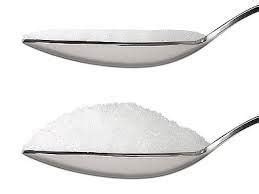The sweet taste of sugar - it's a staple in many of our diets, but have you ever stopped to think about the calories in just one teaspoon of sugar? As we navigate the complex world of nutrition, it's essential to understand the calorie content of this common ingredient.
In this article, we'll delve into the world of sugar calories, exploring the nutritional facts behind a single teaspoon of sugar. We'll also discuss the implications of sugar consumption on our overall health and provide tips on how to make informed choices about sugar in your diet.
Understanding Sugar Calories
Before we dive into the specifics, let's talk about what sugar is and how it affects our bodies. Sugar is a type of carbohydrate that provides energy for our bodies. There are many types of sugar, including table sugar (sucrose), high-fructose corn syrup, and natural sugars like honey and maple syrup.
When it comes to calorie content, sugar is relatively high on the list. According to the United States Department of Agriculture (USDA), one teaspoon of sugar contains approximately 16 calories. This may not seem like a lot, but it can add up quickly, especially if you're consuming multiple teaspoons per day.

The Breakdown: 1 Tsp Sugar Calories
Here's a more detailed breakdown of the nutritional content in one teaspoon of sugar:
- Calories: 16
- Carbohydrates: 4 grams
- Sugars: 4 grams
- Fat: 0 grams
- Protein: 0 grams
As you can see, sugar is essentially empty calories, providing no nutritional value while contributing to your daily calorie intake.
The Impact of Sugar Consumption on Health
Consuming high amounts of sugar has been linked to various health problems, including:
- Weight gain and obesity
- Increased risk of type 2 diabetes
- Higher risk of heart disease and stroke
- Potential contribution to certain types of cancer
It's essential to note that not all sugar is created equal. Naturally occurring sugars, like those found in fruits and vegetables, are generally accompanied by fiber, vitamins, and minerals that provide nutritional value.

Tips for Reducing Sugar Intake
If you're looking to cut back on sugar in your diet, here are some helpful tips:
- Read labels carefully: Check the ingredient list for added sugars, which can be hidden under various names like high-fructose corn syrup, honey, or maple syrup.
- Choose whole foods: Focus on whole, unprocessed foods like fruits, vegetables, whole grains, lean proteins, and healthy fats.
- Limit sugary drinks: Avoid sugary drinks like soda, sports drinks, and sweetened teas and coffee.
- Cook at home: Preparing meals at home allows you to control the amount of sugar that goes into your food.

Conclusion: Make Informed Choices
As we've explored the world of sugar calories, it's clear that even small amounts can add up quickly. By understanding the nutritional content of sugar and being mindful of our consumption, we can make informed choices about the foods we eat.
Remember, a balanced diet is all about variety and moderation. Enjoy your favorite sweet treats in limited amounts, and focus on whole, nutrient-dense foods to keep your body and taste buds happy.





How many calories are in a teaspoon of sugar?
+There are approximately 16 calories in a teaspoon of sugar.
What are the health risks associated with high sugar consumption?
+Consuming high amounts of sugar has been linked to weight gain, type 2 diabetes, heart disease, and certain types of cancer.
How can I reduce my sugar intake?
+Read labels carefully, choose whole foods, limit sugary drinks, and cook at home to control the amount of sugar in your diet.
